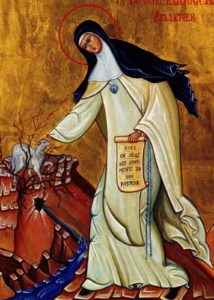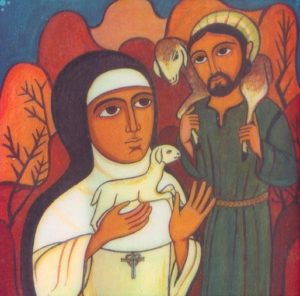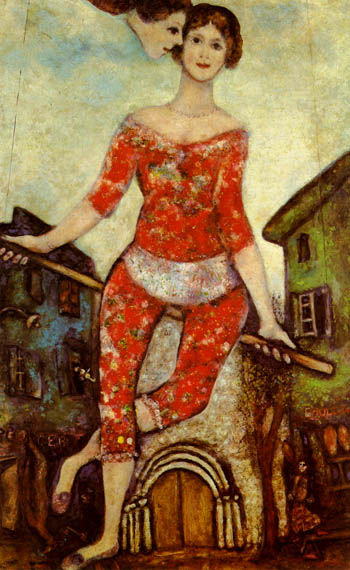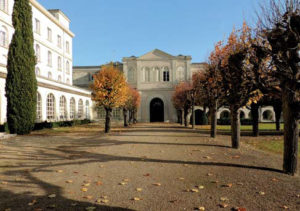Spirituality St Mary Euphrasia
ROSE VIRGINIE PELLETTIER’S ENCOUTER WITH GOD

The encounter with God of Rose Virginie Pellettier, later known as religious, Mother Mary of Saint Euphrasia Pellettier, took place during her adolescence, in a period of pain and discouragement. After her father’s death, in 1810 she was torn away from her family, when she was taken to a boarding school in Tours for her education (she would never see her mother again) and from her joyful and carefree life on the island of Noirmoutier, on the Atlantic coast of France, where she was born in 1796. In Tours, on the other hand, the rigid “Boarding school of the Christian Association awaited her, with its high walls and locked doors, where discipline consisted mainly of prohibitions and warnings”.(cf. From our Holy Mother to us the essential does not change. Lectures given by Sister Mary Euphrasia Degris, Good Shepherd – Angers 1972).
Here, wounded and uprooted, her heart discovered that she was loved with a love ‘beyond comprehension’. Shattered by suffering, Rose Virginie’s heart opens up to receive an extraordinary intuition: “I, you, whoever you are, whatever you do, you are LOVED.” (Saint Mary Euphrasia Pellettier founder of the Sisters of Our Lady of Charity of the Good Shepherd, Publication of 1996, on the occasion of the bicentenary of her birth).
Since you are precious and honored in my sight
But precisely in Tours, in 1814, on 20th August, the festivity of the Heart of Jesus, Rosa Virginia welcomed the spiritual legacy of St John Eudes: she entered the monastery of Our Lady of Charity, one hundred years after its foundation.

In the seventeen years she spent in the Refuge of Our Lady of Charity of Tours, part of which she was the very young superior from 1829, “through the chain of generations, following the carefully preserved example of the founders (of the Refuge, editor’s note) such as Sisters Marie de la Trinité Hertaut and Marie de Ste Catherine Moisan, Mary Euphrasia feels and resonates her Founder’s zeal. She knows Father Eudes and has assimilated the essence of his message, so as to be able to live it and encourage her Sisters to live it” (Saint Mary Euphrasia: Her Life and Works, Document edited by Sister Cécile Lionnet, Angers, 2011).
Saint Mary Euphrasia has a wide religious culture. In Conferences and Instructions, most of which were not written directly by the Saint, but collected and written in the form of notes by the Sisters who had the good fortune to hear them from her voice, she refers to an infinite number of texts taken from Sacred Scripture, often quoting them in full sense, or giving them a brilliant interpretation very freely. And she does the same with the examples and texts of the Saints.
FOLLOWING JESUS THE GOOD SHEPHERD

The heart of God is revealed in the biblical theme of the Good Shepherd
«Contemplation of the Heart of God was expressed by St Mary Euphrasia in three inseparable devotions: to the Sacred Heart, to the Eucharist, to the Blessed Virgin. It was the contemplation of an unspeakable love:
“If we were allowed to see a single ray of this Heart all burning with charity, the sun would seem trivial to us.”
“The Eucharist is our strength, our treasure. “It is God made accessible… like an invisible spring that suddenly gushes forth…”
Quoting St John Eudes, Mary Euphrasia says: “Through Mary, merciful love is born among the living, but Mary is nothing, can do nothing without Jesus. – She forms a single heart with Jesus.”» (Publication of 1996, on the occasion of the bicentenary of the birth of the Foundress).
“You will not do any good, my dear daughters, nor will you have the spirit of our vocation, unless you have the thoughts, feelings and affections of the Good Shepherd.”
cf. Conferences and Instructions, Ch. VI
PRAYER OF SAINT MARY EUPHRASIA
God Of Compassion,
May Every Beat of my heart
be a prayer
to obtain grace and pardon
for sinners.
May all my sighs
be so many appeals
to your infinite mercy!
May each look have the virtue
to gain to your love
those souls whom I shall look on!
May the food of my life
be to work without ceasing
For thy glory
and the salvation of souls!
Amen

The spiritual life of the Mother was characterized by a deep union with the Lord and by the incessant intercession to the Heart of the Good Shepherd so that people would welcome his love and become involved in building his Kingdom in the world.
PRAYER TO SAINT MARY EUPHRASIA
To St Mary Euphrasia, friend, sister, mother and teacher
We want to open your heart
with its sorrows and joys
its treasures and miseries
its longings and hopes…
We long for
your understanding as a friend,
your help as a sister,
your sympathetic tenderness
as a mother,
your light, your example as a teacher.
Saint Mary Euphrasia
Grant me this grace…
Our Father, Hail Mary, Glory Be…
AN EXISTENCE IN STORMY TIMES
 We know that Rose Virginie Pelletier, the eighth of nine children, was born on 31 July 1796 in France, in Noirmoutier, a small island in the Atlantic Ocean, where her parents were confined during the Terror period because they were accused of being against the Jacobins: an accusation from which they will be convicted.
We know that Rose Virginie Pelletier, the eighth of nine children, was born on 31 July 1796 in France, in Noirmoutier, a small island in the Atlantic Ocean, where her parents were confined during the Terror period because they were accused of being against the Jacobins: an accusation from which they will be convicted.

Very lively girl and leader of her group, according to her friends, Rose Virginie prevailed in all the games and in all their adventures (Minutes, Sister Madeleine de Ste Rose Prudhomme. P. 121-122). Her exuberance made her mother say these prophetic words: “This child will be the blessing of our house”. After her first fervent communion, in her early years at school, the teacher would tell her without delay: “You will be either an angel or a devil”. Rose Virginie promptly replied: “I will become a religious”.
The death of her father, in 1804, broke the family harmony and opened a decade of sadness and separation. In 1810, Mrs. Pelletier decided to leave the beloved island of Noirmoutier and to provide her 14-year-old daughter with a good education at a boarding school run by a friend of hers in Tours.
At the age of 18 she entered the Order of Our Lady of Charity in Tours where she was given the name of Mary of St Euphrasia. During the years of her religious formation she nourished her spirituality by reading the Bible and the writings of St John Eudes. Combining a life of apostolic zeal with a deep spirituality, she dedicated the first years of her religious life to active apostolate with young people.
At the age of 29 she was elected superior and under her guidance the community and the apostolate in Tours, received new impulse.
She had a very positive vision of human beings. Not only does she believe in the absolute dignity of each person, but also in their potential, their ability to evolve and grow. She deeply loved the women and girls entrusted to her care: through her they experienced that they were loved by God, found a sense of their own worth and discovered that they werw called to give themselves entirely to the Lord.
“There is always something good in every human person: the spark with which to reignite the fire”
On 11 November 1825, Mary Euphrasia founded the Magdalene Sisters, who received the Constitutions based on the primitive Rule of the Carmel, lived in a section of the same monastery and dedicated themselves to praying for the mission, through a life of silence and solitude.
Upon invitation of Bishop Charles Montault, she founded a house in Angers in 1829 and called it “Good Shepherd” in memory of an institution in Angers, which was dedicated to a similar work before the Revolution. On 28 August 1831, she also established a community of Magdalene Sisters in Angers. Countess Geneviève d’Andigne and Count Augustin de Neuville played a very active role in the foundation and expansion of the mission.
At the same time, the Community of Angers welcomed young women who wished to dedicate their lives to God in the apostolic mission and Mary Euphrasia received many requests for the opening of new missions. Mary Euphrasia reflects on how to respond to the various requests and understood that a change in the organization of the monasteries was necessary: from autonomous monasteries to monasteries that were interdependent on a single mother house (Generalate). In this way the sharing of human and material resources was guaranteed in order to multiply the possibilities of helping more women and girls: the age of the Industrial Revolution broadened the needs of the female world. Her organizational audacity, strengthened by her faith in Providence, made her face, with courage and humility, the trials of the birth of a new idea of “general governance”, almost a precursor of the management sciences of our day. The newness of her vision was shared with a group of sisters, who werw attracted like her by the wish to extend the Holy Work for the salvation of souls.

Therefore, she wrote to Cardinal Carlo Odescalchi, Cardinal Vicar of Pope Gregory XVI, to ask for the establishment of a Generalate for the French Foundations. Her request was granted on 16 January 1835, thanks to the far-sightedness of the Pontiff who recognized its newness and generativity by extending the scope of the mission to the whole world. Thus was born the Congregation of Our Lady of Charity of the Good Shepherd of Angers. In this name remained clear and maintained the roots of the new Congregation. The Congregation spread rapidly: at her death on 24 April 1868, 110 houses had been opened in the world, thus confirming an exceptional generativity. Saint Mary Euphrasia was canonized on 2 May 1940.
